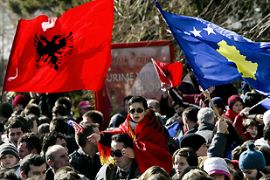Kosovo marks year of ‘independence’
Ethnic-Albanians celebrate first anniversary since their state broke from Serbia.

But in defiance of the celebrations, Serbian legislators from Belgrade, the Serb capital, attended a session of a “rebel parliament” in Kosovo’s majority-Serb north, reasserting their opposition to Kosovo’s independence.
The Serb minority in northern Kosovo, a primarily ethnic-Albanian territory, is protected by a Nato-led peacekeeping force.
Speaking to Al Jazeera, Oliver Ivanovic, Serbia’s secretary of state for Kosovo, said: “Kosovan Albanians are celebrating but none of the Serbs are celebrating with them. Kosovo Serbs should not feel alone, not today and not in the future.”
With regard to Serbia’s attempts to reclaim Kosovo, Ivanovic said: “This is not the same Serbia… instead of using the army we are using the law and international relations.”
Independence opposed
Since breaking away from Serbia in 2008, Kosovo has been recognised by 54 mainly Western countries and adopted the trappings of full statehood including an anthem, constitution, flag, security force and even an intelligence agency.
| IN VIDEO |
|
|
But Serbia and its ally Russia remain opposed to Kosovo’s independence.
Thaci, a former leader of the political wing of the ethnic Albanian separatists who fought Serb forces in Kosovo between 1998 and 1999, said that Serbia could benefit from recognising Kosovo.
“There are other countries that fought against each other but they have built good bilateral relations. Therefore, it is in our interest that Kosovo and Serbia have good bilateral co-operation,” he said.
“My invitation to Serbia on this independence’s anniversary is to recognise Kosovo.”
Crippling problems
Boris Tadic, the Serbian president, said on Monday that Kosovo was far from independent and suffered organised crime and human rights abuses.
“A year later, it’s clear to everyone who wants to see the real situation in Kosovo that it’s not a state,” Tadic told the AFP news agency.
Kosovo is hoping that greater recognition will help lift it out of crippling economic problems, with unemployment widespread and around 40 per cent of the population living below the poverty line.
Kosovo’s military conflict with Serbia ended in 1999 after Nato carried out at 78-day bombing campaign intended to end a Serb military crackdown on ethnic Albanian separatists in the region.
From 1999 until it declared its independence on February 17, 2008, Kosovo was administered by the UN.
